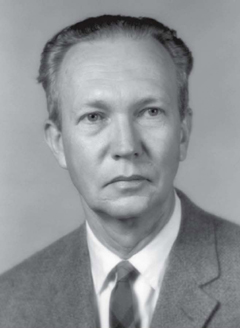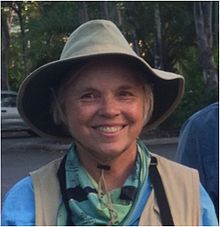
Edward Osborne Wilson was an American biologist, naturalist, ecologist, and entomologist known for developing the field of sociobiology.
Sociobiology is a field of biology that aims to explain social behavior in terms of evolution. It draws from disciplines including psychology, ethology, anthropology, evolution, zoology, archaeology, and population genetics. Within the study of human societies, sociobiology is closely allied to evolutionary anthropology, human behavioral ecology, evolutionary psychology, and sociology.

Berthold Karl HölldoblerBVO is a German zoologist, sociobiologist and evolutionary biologist who studies evolution and social organization in ants. He is the author of several books, including The Ants, for which he and his co-author, E. O. Wilson, received the Pulitzer Prize for non-fiction writing in 1991.

Sociobiology: The New Synthesis is a book by the biologist E. O. Wilson. It helped start the sociobiology debate, one of the great scientific controversies in biology of the 20th century and part of the wider debate about evolutionary psychology and the modern synthesis of evolutionary biology. Wilson popularized the term "sociobiology" as an attempt to explain the evolutionary mechanics behind social behaviour such as altruism, aggression, and the nurturing of the young. It formed a position within the long-running nature versus nurture debate. The fundamental principle guiding sociobiology is that an organism's evolutionary success is measured by the extent to which its genes are represented in the next generation.
David C. Queller is an evolutionary biologist at Washington University in St. Louis. He received his BA from The University of Illinois in 1976, and his PhD from the University of Michigan in 1982. Queller became a faculty member at Rice University in 1989 and remained there until 2011 when he was named Spencer T. Olin Professor of Biology at Washington University in St. Louis. Since the late 1980s, Queller has collaborated extensively with his wife and colleague Joan E. Strassmann. Empirically, Queller and Strassmann worked primarily with social insects until they made the switch to the social amoebae, Dictyostelium discoideum, in 1998.

Not in Our Genes: Biology, Ideology and Human Nature is a 1984 book by the evolutionary geneticist Richard Lewontin, the neurobiologist Steven Rose, and the psychologist Leon Kamin, in which the authors criticize sociobiology and genetic determinism and advocate a socialist society. Its themes include the relationship between biology and society, the nature versus nurture debate, and the intersection of science and ideology.
Richard D. Alexander was an American zoologist who was a professor at the University of Michigan and curator at the university's museum of zoology of in Ann Arbor, Michigan. His scientific pursuits integrated the fields of systematics, ecology, evolution, natural history and behavior. The salient organisms in his research are wide-ranging, from the orthopterans and Cicadidae (cicadas) to vertebrates: dogs, horses, and primates, including humans.
Joan Roughgarden is an American ecologist and evolutionary biologist. She has engaged in theory and observation of coevolution and competition in Anolis lizards of the Caribbean, and recruitment limitation in the rocky intertidal zones of California and Oregon. She has more recently become known for her rejection of sexual selection, her theistic evolutionism, and her work on holobiont evolution.

Howard Ensign Evans was an American entomologist who was a specialist on wasps. He was also the author of several popular works on entomology including Life on a Little-known Planet (1978), The Pleasures of Entomology (1985) and Wasp Farm (1963).

Hubert Simon Markl was a German biologist who also served as president of the Max Planck Society from 1996 to 2002.

Robin Fox was an Anglo-American anthropologist who wrote on the topics of incest avoidance, marriage systems, human and primate kinship systems, evolutionary anthropology, sociology and the history of ideas in the social sciences. He founded the department of anthropology at Rutgers University in 1967 and remained a professor there for the rest of his career, also being a director of research for the H. F. Guggenheim Foundation from 1972 to 1984.
Mary Jane West-Eberhard is an American theoretical biologist noted for arguing that phenotypic and developmental plasticity played a key role in shaping animal evolution and speciation. She is also an entomologist notable for her work on the behavior and evolution of social wasps.
Gene Ezia Robinson is an American entomologist, Director of the Carl R. Woese Institute for Genomic Biology and National Academy of Sciences member. He pioneered the application of genomics to the study of social behavior and led the effort to sequence the honey bee genome. On February 10, 2009, his research was famously featured in an episode of The Colbert Report whose eponymous host referred to the honey Dr. Robinson sent him as "pharmaceutical-grade hive jive".
Virginia Walbot is an American agriculturalist and botanist who is a professor in the Department of Biology at Stanford University. She investigates maize development with a focus on factors involved in male sterility.
Susan C. Alberts is an American primatologist, anthropologist, and biologist who is the current Chair of the Department of Evolutionary Anthropology at Duke University; previously, she served as a Bass fellow and the Robert F. Durden Professor of Biology at Duke. She currently co-directs the Amboseli Baboon Research Project with Jeanne Altmann of Princeton University. Her research broadly studies how animal behavior evolved in mammals, with a specific focus on the social behavior, demography, and genetics of the yellow baboon, although some of her work has included the African elephant. She was elected a fellow of the American Academy of Arts and Sciences in 2014, won the Cozzarelli Prize of the National Academy of Sciences in 2016, and was elected a fellow of the National Academy of Sciences in 2019.
Edward M. Barrows is a biologist who earned his BS in Botany and Zoology at the University of Michigan, Ann Arbor, in 1968, and his PhD in entomology, mentored by Charles Duncan Michener, at the University of Kansas, Lawrence in 1975. Further, he is a retired U.S. Army officer. He has had a lifetime interest in nature, science, and art. He performed research on bee nesting, predation, and reproductive behavior, for example, finding that female Lasioglossum zephyrus sweat bees have individual odors perceived by conspecific males. This was evidently the first discovery of invertebrate individual odors, as opposed to group or nest odors. He later found that males of the Xylocopa virginica virginica have highly complex mate searching and mate-acquisition behaviors, perhaps more complicated that any other bee species and many other animal species. Students and he studied feeding behavior and recovery from injuries in Mimus polyglottos. With students and established scientists, he studied or is studying arthropod community structure in a rare, freshwater, tidal, marsh, and associated habitats, evolution of floral display in Asclepias syriaca, parasitization and reproductive behavior of chalcidoid wasps, floral associates of rare plants, and other topics. His research in scientific communication led to the book Animal Desk Reference, A Dictionary of Animal Behavior, Ecology, and Evolution. His current research laboratory, the Laboratory of Entomology and Biodiversity, is in the Heyden Observatory of Georgetown University.
Susan Elise Riechert is an American behavioral ecologist known for her research in evolutionary biology, evolutionary game theory and the behavior of spiders. She is also known for her "biology in a box" teaching materials, used by hundreds of thousands of elementary and secondary school students in Tennessee.
Dorothy Leavitt Cheney was an American scientist who studied the social behavior, communication, and cognition of wild primates in their natural habitat. She was Professor of Biology at the University of Pennsylvania and a member of both the US National Academy of Sciences and the American Academy of Arts and Sciences.
Ullica Christina Olofsdotter Segerstråle is an American sociologist and historian of science who is professor of sociology at the Illinois Institute of Technology.
Zuleyma Tang-Martínez is an emeritus professor of biology at the University of Missouri–St. Louis. Earlier in her career she published under her former married name, Zuleyma Tang Halpin.







